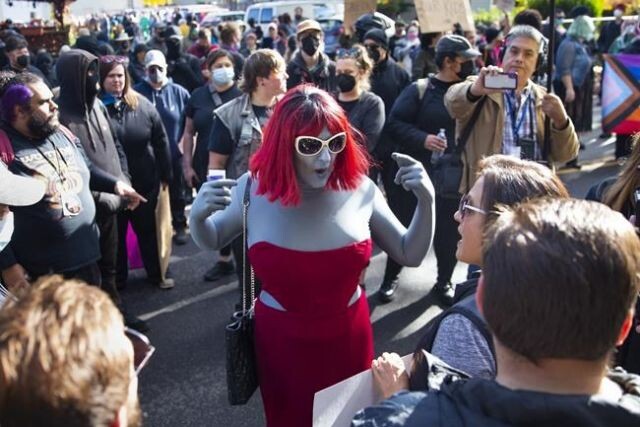
In a classroom inside Country Hills Library, a member of Calgary’s drag community reads books to children.
Dressed in a green and blue vest over a white shirt with a black tie, The Frizz asks participants to join in.
«Just. Be. Who. You. Are,» the drag monarch says with some of the couple dozen children brought to the story time by their parents and grandparents.
The Frizz, who has long, curly hair and a moustache, is joined by drag king Shane Onyou, who is dressed in a glittered jacket and bejewelled captain’s cap, at the Reading with Royalty program.
The program, held on March 27, was recorded in a video provided to The Canadian Press by the Calgary Public Library after declining a request for a reporter and a photographer to attend.
The family-friendly story times are led by members of the local drag community, and children are invited to dress in their best outfit, cape or crown.
The program, however, has faced escalating protests in Calgary and other cities around the world with complaints that drag contributes to the sexualization or grooming of children.
Derek Reimer, a 36-year-old pastor, faces hate-motivated offences after protesters disrupted a reading at the city’s Seton Library in February. Police said Thursday that Reimer was rearrested and charged again with causing a disturbance and shouting hate speech at two more events.
Calgary city council recently updated its bylaws to try to get a handle on those demonstrations. Protesters are now required to be 100 metres back from the entrance of any public library or recreation facility.
At the Country Hills Library in March, two men stood holding placards along the edge of the library’s parking lot. A larger protest could be heard on a loudspeaker a few blocks away.
Dozens of members of the drag community and its supporters gathered closer to the entrance of the library.
A line of people wearing pink angel wings and masks stood silently, attempting to shield children from protesters. Some held signs that read «Kids Love Drag» and «I Support Drag.»
Several teens sang «Let it Go» and «Dancing Queen» nearby as police officers, on bikes and in marked vehicles, kept watch and recorded video between the protest and the rally.
Deborah Donovan, a grandparent attending with her daughter and 14-month-old twin grandchildren, said she doesn’t understand why there are protesters.
«I really think they are living in another century or decade,» she said.
«It’s ridiculous. It’s almost Americanized, something you see happening in the Deep South. It can stay there.»
James Demers is an activist who helped with the rally. Reading with Royalty, he said, has been running for five years without problems.
«This is a post-COVID impact,» suggested Demers. «These people are looking for community, they found it over COVID protesting and we have become the target.»
Many have shown their support to the drag community in recent months.
«I am here to support the drag queens and the idea of diversity and the idea of children learning to read rather than hate,» Alison Whitley said at the rally.
«It’s human rights. It’s our children learning that the world can be a beautiful, rainbow place with literacy rather than narrow views.»
Parent Lisa Ha said it was a fun program to attend on the way out of the library. She wants her boys to be «exposed to everything and anything, and share that everyone is equal.»
Kris Wells, an expert on gender and youth at MacEwan University in Edmonton, said many of the protests are connected to a movement in the United States.
«This far-right fringe movement … (is) using the 2SLGBTQ+ community as a scapegoat for hate and prejudice, continuing to recycle tired old stereotypes under this new language they’re using of groomers, of talking about protecting children from — whether it’s child pornography or pedophilia — that they associate with being a 2SLGBTQ person,» he said.
Wells said it’s trying to undo the social and legal progress that has been made on the issue in Canada.
«A large contributor to that is the social media and the unregulation of these kind of conspiracy theories, this hateful and harmful rhetoric, the stereotypes, the misinformation,» he said. «You go online and it’s really the Wild West, anything goes.»
Wells said there needs to be a broader conversation about online hate spreading into communities.
«The first thing we have to do is loudly denounce it and show that these kinds of beliefs are not acceptable … and they’re not based in any legitimacy or facts or research,» he said.
«We need our political leaders, our corporate leaders, our major social institutions to speak out and denounce, because hate thrives when it has an audience.»